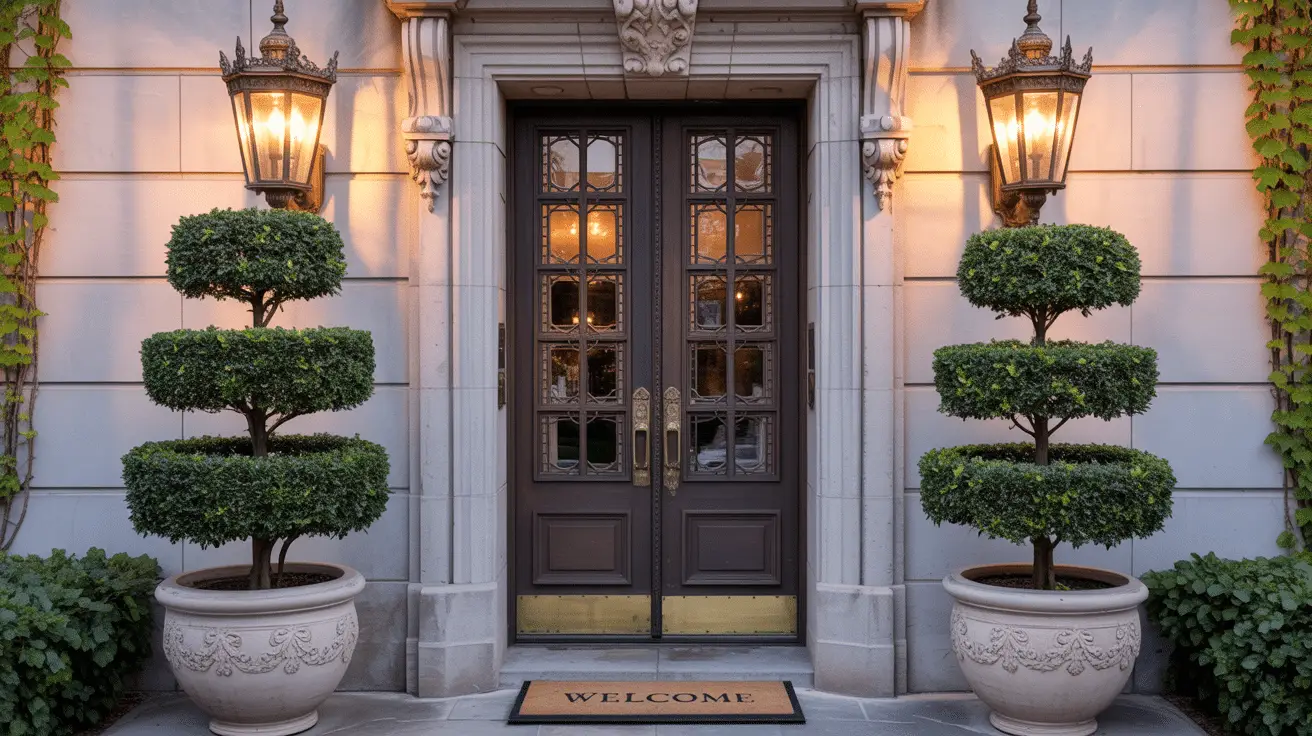Designer Secrets for Styling a Double Door Entryway Like a Pro: Elegant Curb Appeal and Lasting First Impressions
Table of Contents
Introduction
A double door entryway is more than just an entrance—it’s a bold architectural feature that sets the stage for your home’s personality. In fact, studies show that homeowners form a lasting impression within the first 7 seconds of entering a home. That makes your entryway a critical design opportunity, not just for guests, but for your own sense of comfort and pride.
Yet many people struggle with how to properly style a double door entry. Should both doors be decorated? What about lighting, symmetry, or scale? Without a clear plan, the result can feel either underwhelming or overly cluttered.
This guide is your design blueprint. We’ll explore insider tips from professional designers to help you transform your entryway into a visually striking and cohesive statement. From scale and proportion to lighting, landscaping, and seasonal styling, every detail contributes to creating an entry that feels warm, balanced, and unforgettable.
Whether your home leans modern, traditional, or somewhere in between, you’ll find ideas here to match your style and boost your curb appeal. Let’s dive into the stylistic secrets that turn a simple doorway into an elevated experience.
Create Balance Through Symmetry and Scale
Symmetry is the backbone of a well-styled double door entry. Designers often begin by grounding the space with visually balanced elements on either side of the doors—think matching sconces, identical planters, or symmetrical seating. These details create a sense of harmony and intention, making the entrance feel grand without being overwhelming.
Proportion is equally important. A pair of tiny pots or short lanterns can make tall double doors appear even more massive and disproportionate. Instead, scale your decor to the size of your doors and surrounding architecture. If your doors are eight feet tall, opt for planters that are at least 24–30 inches high, and sconces that span a vertical third of the wall space beside each door.
To avoid visual clutter, keep the number of decorative elements low but impactful. Focus on larger, well-placed items instead of layering too many small accents.
Table: Symmetry & Scale Checklist
| Element | Symmetry Tip | Scale Tip |
| Planters | Use identical pots on both sides | Choose height relative to door size |
| Lighting | Match sconces or lanterns evenly | Select fixtures proportionate to wall space |
| Mats or Rugs | Centered and sized to both doors | Wider rugs make double doors feel grounded |
| Decorative Accents | Keep matching pairs (e.g., topiary) | Avoid too-small items that look underwhelming |
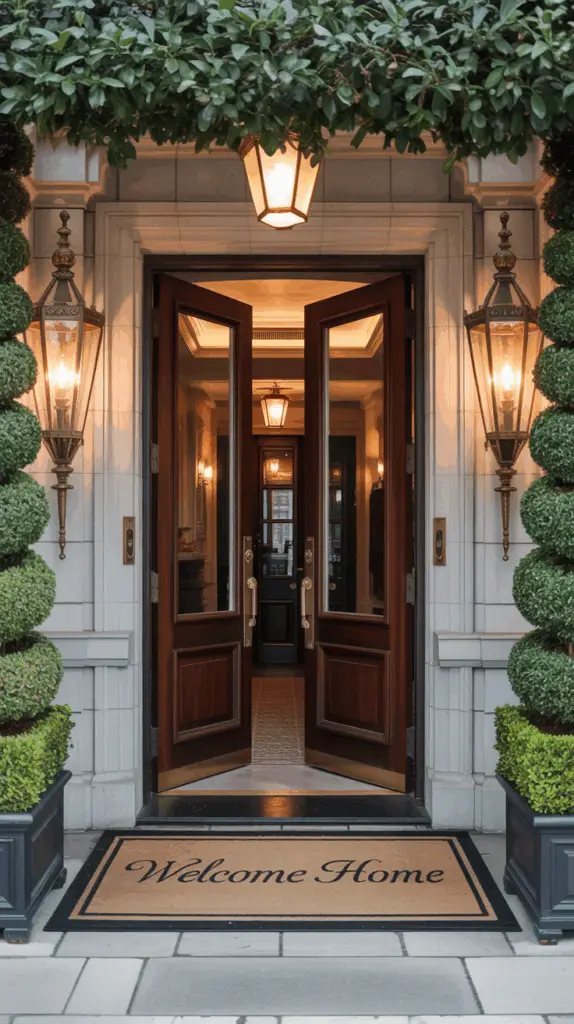
Layer Lighting for Day-to-Night Ambiance
Lighting doesn’t just guide you to the door—it creates mood, enhances safety, and elevates your home’s nighttime presence. Professionals layer lighting by combining functional and decorative elements to provide both utility and atmosphere.
Start with wall sconces or pendant lights flanking your double doors. These should align roughly at eye level, placed about 60–66 inches from the ground. Choose warm LED bulbs (2700K–3000K) for a soft glow that flatters architectural features.
Accent lighting adds another layer. Uplighting trees, spotlighting house numbers, or installing path lights along your walkway all add dimension. Consider timers or smart lighting systems to automate transitions from day to evening.
Inside the entry, place a chandelier or statement pendant in your foyer that aligns visually with the doors, reinforcing a sense of continuity and drama when the doors are open.
Table: Outdoor Lighting Elements Breakdown
| Lighting Type | Placement | Purpose | Designer Tip |
| Wall Sconces | Flanking both doors | General visibility, visual balance | Choose weatherproof, dimmable fixtures |
| Step/Path Lighting | Along walkway | Safe navigation | Use warm light to guide guests subtly |
| Landscape Uplights | Beneath trees/plants | Highlighting greenery | Angle lights to avoid glare |
| Overhead Fixtures | Porch ceiling or above doors | Focal point for entry | Opt for style that matches door hardware |
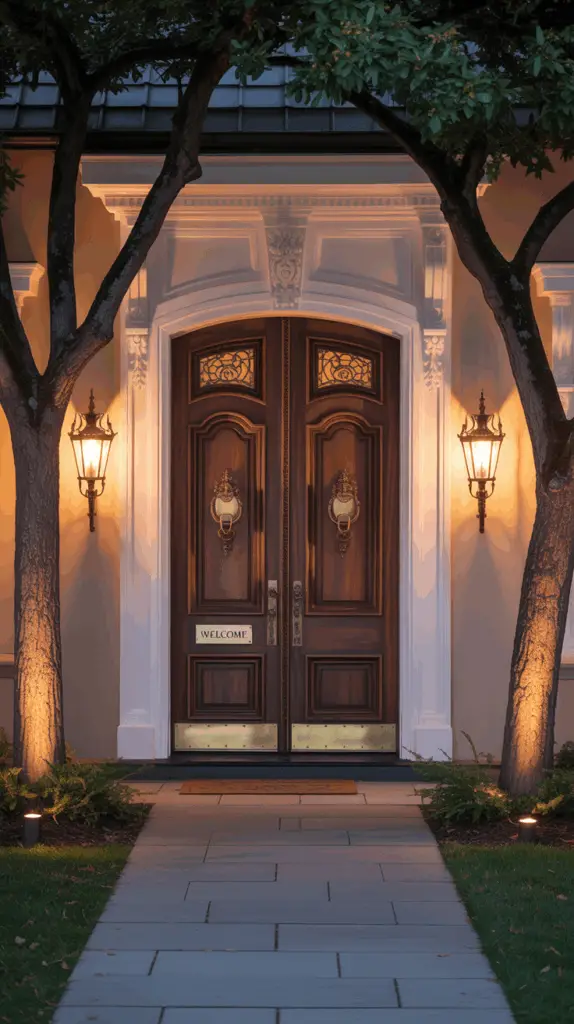
Seasonal Styling with Purpose
Seasonal decor brings life and personality to your entryway, but restraint is key. The most successful seasonal styling blends festive elements with foundational design—never allowing decorations to overpower the architecture.
For fall, try layered doormats in warm tones, small stacks of pumpkins, or lanterns with faux candles. In winter, a matching pair of wreaths and subtle twinkle lights feel timeless. Spring and summer call for floral planters, bright cushions on benches, or wind chimes that add soft movement.
Keep the entry cohesive by choosing a color palette or material theme—natural woods and greens for spring, metallics and white for winter—and repeating those choices across multiple decor elements.
Table: Seasonal Styling Themes
| Season | Color Palette | Key Decor Elements | Designer Tip |
| Fall | Terracotta, gold, rust | Pumpkins, layered rugs, lanterns | Limit to 3-4 items to avoid clutter |
| Winter | Silver, green, white | Wreaths, string lights, evergreen pots | Choose LED lights with warm white glow |
| Spring | Pastels, green, white | Floral planters, birdhouses, wreaths | Echo floral colors from nearby landscaping |
| Summer | Navy, yellow, coral | Outdoor cushions, citronella lanterns | Add breezy textures like linen or rattan |
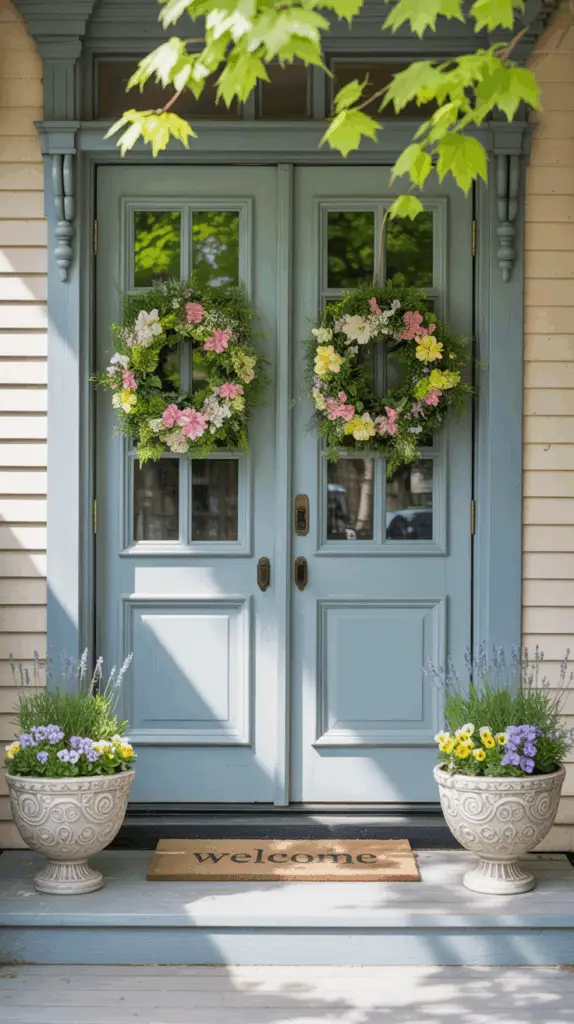
Elevate with Architectural Enhancements
Sometimes, the styling secret lies in the architecture itself. Adding or upgrading permanent features like trim, hardware, or transoms can dramatically boost your entryway’s impact without adding clutter.
Consider painting the doors in a contrasting yet tasteful color—navy, deep green, or even black for dramatic effect. Upgrading to modern matte black or brushed brass hardware instantly refreshes dated doors. Add crown molding or decorative trim around the doors to frame them like a work of art.
If your entry lacks natural light, a transom or sidelights can make a huge difference. They introduce light into the foyer and enhance the vertical presence of your door design.
Table: Architectural Styling Upgrades
| Upgrade Type | Impact | Investment Level | Design Tip |
| Door Paint Color | Boosts curb appeal instantly | Low | Use contrasting yet cohesive tones |
| Door Hardware | Updates style and security | Low to Moderate | Match metal finishes to lighting |
| Transoms/Sidelights | Adds light and visual height | Moderate to High | Frosted glass adds privacy |
| Decorative Trim | Frames doors with elegance | Moderate | Coordinate with exterior molding |
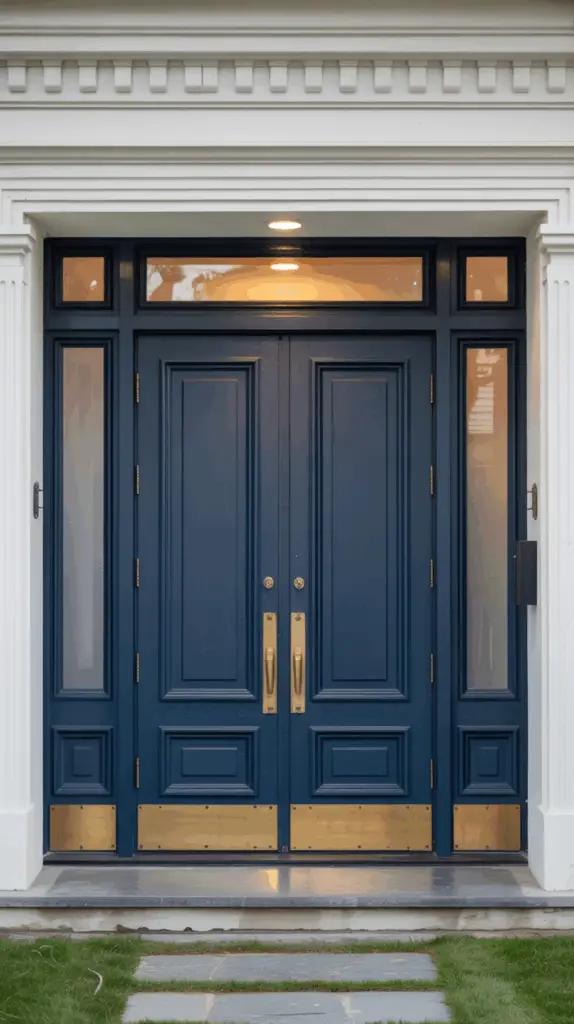
Design the Perfect Threshold: Rugs, Mats, and Flooring
What lies underfoot is just as important as what surrounds your doors. Rugs and mats not only provide functionality—trapping dirt and preventing slips—but also establish a defined zone for the entryway.
Double doors benefit from extra-wide rugs that span the full width of both entrances. Choose durable, weatherproof materials like coir, polypropylene, or recycled rubber that can withstand outdoor elements. Layering a larger neutral rug under a patterned welcome mat adds texture and dimension.
If your entry has a covered porch, consider tile inlays or painted concrete for a permanent design statement. Patterned cement tiles, herringbone bricks, or pebble mosaics give a designer touch that withstands all seasons.
Table: Entryway Flooring & Mat Ideas
| Type | Best For | Design Benefit | Material Tip |
| Coir Doormats | Everyday use | Natural texture, classic look | Replace seasonally to prevent fading |
| Polypropylene Rugs | Covered porches | Fade-resistant, customizable patterns | Ideal for layering with a smaller mat |
| Outdoor Tiles | High-impact permanent styling | Adds luxury and pattern | Choose slip-resistant, frost-proof tiles |
| Painted Concrete | DIY-friendly porches | Custom color or stencil options | Seal annually to maintain vibrancy |
Style with Greenery and Planters that Wow
Plants are one of the most effective—and budget-friendly—ways to bring life to your entryway. For double door entries, opt for symmetry with matching planters, or choose large singular pots that balance the scale.
Ornamental grasses, boxwoods, olive trees, or topiary spirals provide height and structure. In warmer months, rotate in colorful annuals or trailing ivy. Consider texture and leaf shape as much as color for a truly designer look.
Use high-quality, weather-resistant containers in ceramic, concrete, or metal. Group planters in odd numbers for a layered effect, and raise some on pedestals or plant stands to add visual movement.
Table: Designer Plant Styling Tips
| Plant Style | Best Used For | Maintenance Level | Design Tip |
| Boxwood Topiary | Formal, structured entries | Low | Keep trimmed to maintain crisp lines |
| Ornamental Grasses | Casual, coastal, or boho entries | Medium | Pair with low ground-cover plants |
| Olive Trees | Mediterranean or modern vibes | Medium to High | Use in oversized ceramic urns |
| Seasonal Florals | Pops of color in spring/summer | High | Mix trailing and upright plants for depth |
Conclusion
Styling a double door entryway like a professional designer is all about intention, proportion, and flow. From anchoring the space with symmetry to layering lighting and textures, every design choice plays a role in setting the tone for your home. Whether you’re embracing seasonal updates, investing in architectural enhancements, or simply arranging a few well-placed planters, remember that your entryway is the handshake of your house—it introduces you before you say a word.
By applying these thoughtful strategies, you’ll create a space that’s not only visually stunning but also welcoming and functional year-round. Let your entryway be the beautiful threshold that invites admiration from guests—and a sense of pride every time you walk through it.

